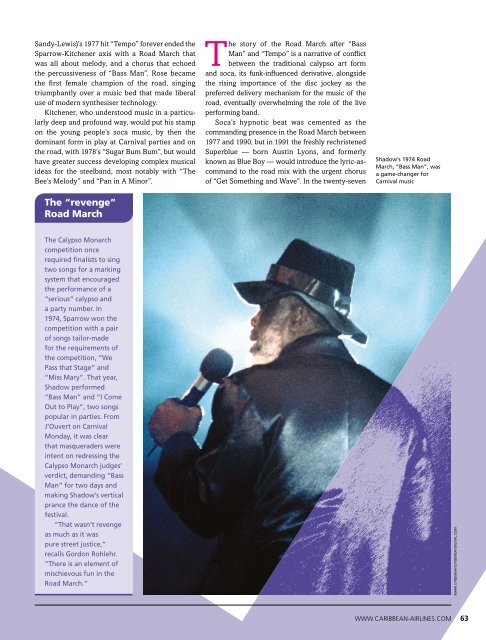Caribbean Beat — January/February 2018 (#149)
A calendar of events; music, film, and book reviews; travel features; people profiles, and much more.
A calendar of events; music, film, and book reviews; travel features; people profiles, and much more.
Create successful ePaper yourself
Turn your PDF publications into a flip-book with our unique Google optimized e-Paper software.
Sandy-Lewis)’s 1977 hit “Tempo” forever ended the<br />
Sparrow-Kitchener axis with a Road March that<br />
was all about melody, and a chorus that echoed<br />
the percussiveness of “Bass Man”. Rose became<br />
the first female champion of the road, singing<br />
triumphantly over a music bed that made liberal<br />
use of modern synthesiser technology.<br />
Kitchener, who understood music in a particularly<br />
deep and profound way, would put his stamp<br />
on the young people’s soca music, by then the<br />
dominant form in play at Carnival parties and on<br />
the road, with 1978’s “Sugar Bum Bum”, but would<br />
have greater success developing complex musical<br />
ideas for the steelband, most notably with “The<br />
Bee’s Melody” and “Pan in A Minor”.<br />
The “revenge”<br />
Road March<br />
The story of the Road March after “Bass<br />
Man” and “Tempo” is a narrative of conflict<br />
between the traditional calypso art form<br />
and soca, its funk-influenced derivative, alongside<br />
the rising importance of the disc jockey as the<br />
preferred delivery mechanism for the music of the<br />
road, eventually overwhelming the role of the live<br />
performing band.<br />
Soca’s hypnotic beat was cemented as the<br />
commanding presence in the Road March between<br />
1977 and 1990, but in 1991 the freshly rechristened<br />
Superblue <strong>—</strong> born Austin Lyons, and formerly<br />
known as Blue Boy <strong>—</strong> would introduce the lyric-ascommand<br />
to the road mix with the urgent chorus<br />
of “Get Something and Wave”. In the twenty-seven<br />
Shadow’s 1974 Road<br />
March, “Bass Man”, was<br />
a game-changer for<br />
Carnival music<br />
The Calypso Monarch<br />
competition once<br />
required finalists to sing<br />
two songs for a marking<br />
system that encouraged<br />
the performance of a<br />
“serious” calypso and<br />
a party number. In<br />
1974, Sparrow won the<br />
competition with a pair<br />
of songs tailor-made<br />
for the requirements of<br />
the competition, “We<br />
Pass that Stage” and<br />
“Miss Mary”. That year,<br />
Shadow performed<br />
“Bass Man” and “I Come<br />
Out to Play”, two songs<br />
popular in parties. From<br />
J’Ouvert on Carnival<br />
Monday, it was clear<br />
that masqueraders were<br />
intent on redressing the<br />
Calypso Monarch judges’<br />
verdict, demanding “Bass<br />
Man” for two days and<br />
making Shadow’s vertical<br />
prance the dance of the<br />
festival.<br />
“That wasn’t revenge<br />
as much as it was<br />
pure street justice,”<br />
recalls Gordon Rohlehr.<br />
“There is an element of<br />
mischievous fun in the<br />
Road March.”<br />
mark lyndersay/lyndersaydigital.com<br />
WWW.CARIBBEAN-AIRLINES.COM 63


















